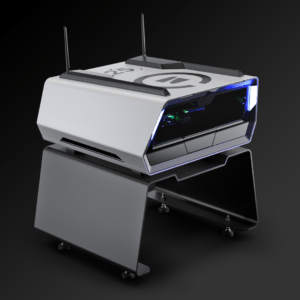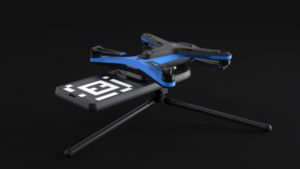 US-based drone manufacturer Skydio introduces Skydio Dock and Dock Lite, powered by Skydio’s new Remote Ops software.
US-based drone manufacturer Skydio introduces Skydio Dock and Dock Lite, powered by Skydio’s new Remote Ops software.
Continue reading below, or listen:
 Docking systems, or “drone-in-a-box” solutions, are the way of the future for remote drone operations. A docking station that can monitor internal and external conditions and recharge drone batteries combined with software for remote operations enables operators to execute drone missions from miles away – or from a central operations hub. That’s a holy grail for many industries, the point at which already valuable drone technology and drone data increases its ROI exponentially. As the FAA allows more missions beyond visual line of sight (BVLOS) – and the drone industry awaits a final rule on BVLOS operations – remote drone ops have become a near term option for many industries.
Docking systems, or “drone-in-a-box” solutions, are the way of the future for remote drone operations. A docking station that can monitor internal and external conditions and recharge drone batteries combined with software for remote operations enables operators to execute drone missions from miles away – or from a central operations hub. That’s a holy grail for many industries, the point at which already valuable drone technology and drone data increases its ROI exponentially. As the FAA allows more missions beyond visual line of sight (BVLOS) – and the drone industry awaits a final rule on BVLOS operations – remote drone ops have become a near term option for many industries.
 Skydio’s drone products are already powered by a ground-breaking autonomy platform, one which helps the operators execute complex missions safely without having to be expert pilots. With the introduction of the Skydio Dock and Dock Lite, Skydio is moving the ball forward on remote drone operations.
Skydio’s drone products are already powered by a ground-breaking autonomy platform, one which helps the operators execute complex missions safely without having to be expert pilots. With the introduction of the Skydio Dock and Dock Lite, Skydio is moving the ball forward on remote drone operations.
Dock and Dock Lite are the smallest, lightest, and smartest cloud-connected base stations for drones available on the market today. Built on powerful AI models, Skydio’s Dock solutions give customers complete remote and autonomous visibility into tasks like site inspection and monitoring, mapping, and situational awareness – indoors and outdoors – from anywhere in the world.
Until today, enterprise and commercial users have had to rely on big, expensive, manual drone-in-a-box solutions that depend on manual flight by on-site pilots. Skydio drones housed in Dock and Dock Lite can fly safely with a single off-site operator, or autonomously, at a fraction of the cost, size, and complexity of existing solutions. Further, Skydio Remote Ops software enhances the drone’s AI-powered autonomy so operators can effortlessly perform streamlined missions.
“The concept of remotely operated drones is incredibly compelling,” said Adam Bry, CEO of Skydio. “It has attracted a gaggle of activity from startups and established manual drone companies, but it’s never going to work the way customers want – let alone scale to address real world applications solving the needs of today – unless you can trust the drone to fly itself. And making drones smart enough to fly themselves is our core focus. Skydio Dock and Skydio Dock Lite, combined with our Remote Ops software, deliver autonomous capabilities for our customers, whether they are monitoring their warehouses, inspecting a security perimeter, or assessing infrastructure following a natural disaster–finally realizing the promise of efficient, scaleable remote operations”
 Skydio Dock, Skydio Dock Lite and Skydio Remote Ops are announced with the participation of Skydio’s Early Access customers and partners, including the North Carolina Department of Transportation, Southern Company, Caltrans, the Oracle Innovation Lab, and Obayashi Construction (Japan).
Skydio Dock, Skydio Dock Lite and Skydio Remote Ops are announced with the participation of Skydio’s Early Access customers and partners, including the North Carolina Department of Transportation, Southern Company, Caltrans, the Oracle Innovation Lab, and Obayashi Construction (Japan).
“(With this technology) we’re able to monitor construction progress in more efficient ways than we previously could. We’re capturing imagery, videos, and live streaming a feed back to our resident engineers for real-time data. It’s a big cost saver for us, and we look forward to implementing it around the state for multiple applications and use cases,” said Thomas Walls, North Carolina Department of Transportation UAS Operations Manager.
BVLOS flight and remote operations aren’t legal everywhere, and operators need to be sure to follow local regulations. However, with the introduction of the remote operations solution, Skydio is also offering services to help customers navigate the regulations and waiver process.
“Skydio’s regulatory team has already obtained multiple, pathbreaking remote operations waivers for US and global customers–with many more in progress. Skydio’s regulatory team partners with our customers to unlock scaleable, efficient remote operations–aided by unmatched knowledge of our products and a strong track record of success with global aviation regulators,” says the Skydio press release.

Miriam McNabb is the Editor-in-Chief of DRONELIFE and CEO of JobForDrones, a professional drone services marketplace, and a fascinated observer of the emerging drone industry and the regulatory environment for drones. Miriam has penned over 3,000 articles focused on the commercial drone space and is an international speaker and recognized figure in the industry. Miriam has a degree from the University of Chicago and over 20 years of experience in high tech sales and marketing for new technologies.
For drone industry consulting or writing, Email Miriam.
TWITTER:@spaldingbarker
Subscribe to DroneLife here.







[…] Source link […]